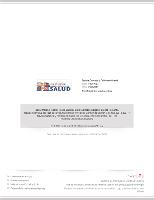Abstract
Introduction: in 2014 hundreds of teenage women in the rural municipality of El Carmen de Bolivar (Colombia) experienced strange symptoms after being vaccinated with Gardasil, one of the vaccines against Human Papillomavirus (HPV). Health authorities did not find a causal link between the vaccination and the symptoms, so they attributed the phenomenon to a possible massive psychogenic reaction. The families of those affected rejected this hypothesis. The case revealed the existence of a controversy among the Colombian scientific community about the safety of the vaccine. The persistence over time of the health problem and its massive nature influenced a drastic decline in vaccination coverage, and the Constitutional Court ruled in 2017 on the mandatory use of informed consent during the vaccination procedure. Methodology: an updated comprehensive narrative review of the literature published between 2014 and 2021 is presented. A synthesis of the scientific information available in Medline, Pubmed, Cochrane, Scielo, Redalyc and Google Scholar was performed. Results: 37 texts were identified, and a categorization of analysis was established in 4 groups: a possible massive psychogenic reaction, a possible adverse reaction to the vaccine, the need to broaden the epistemological approach to understand the phenomenon and a controversy in the Colombian scientific field. Conclusions: the review shows that the application of the HPV vaccine has generated a public health problem whose nature is still controversial, due to the difficulty in identifying an etiological diagnosis of the symptoms of those affected. © 2022 Pontificia Universidad Javeriana. All rights reserved.














